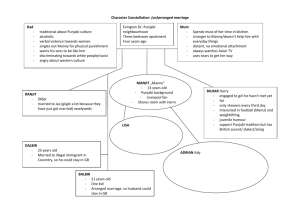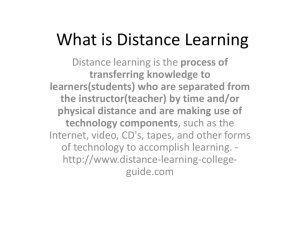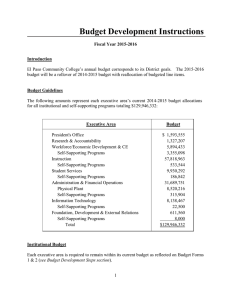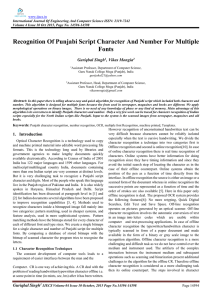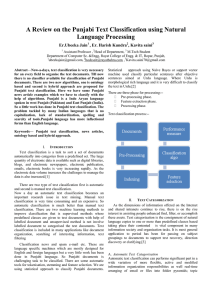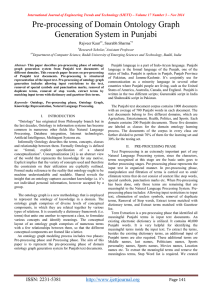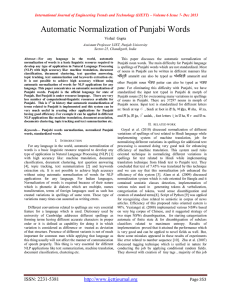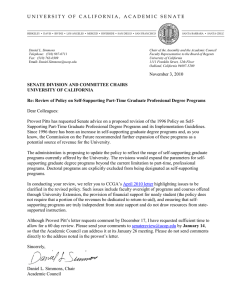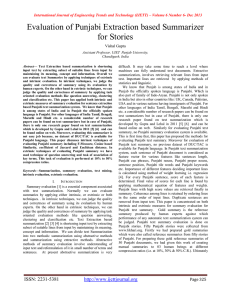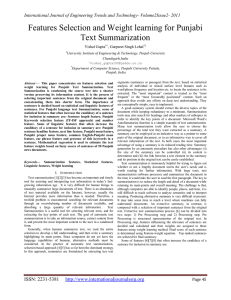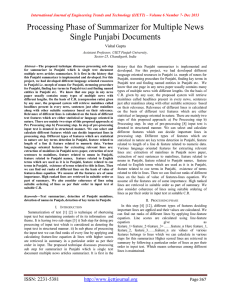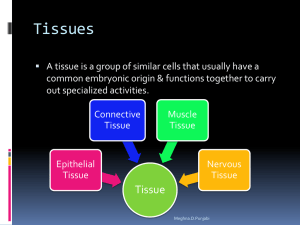PROPOSAL TO OFFER FULLY ONLINE MASTER OF ARTS IN
advertisement
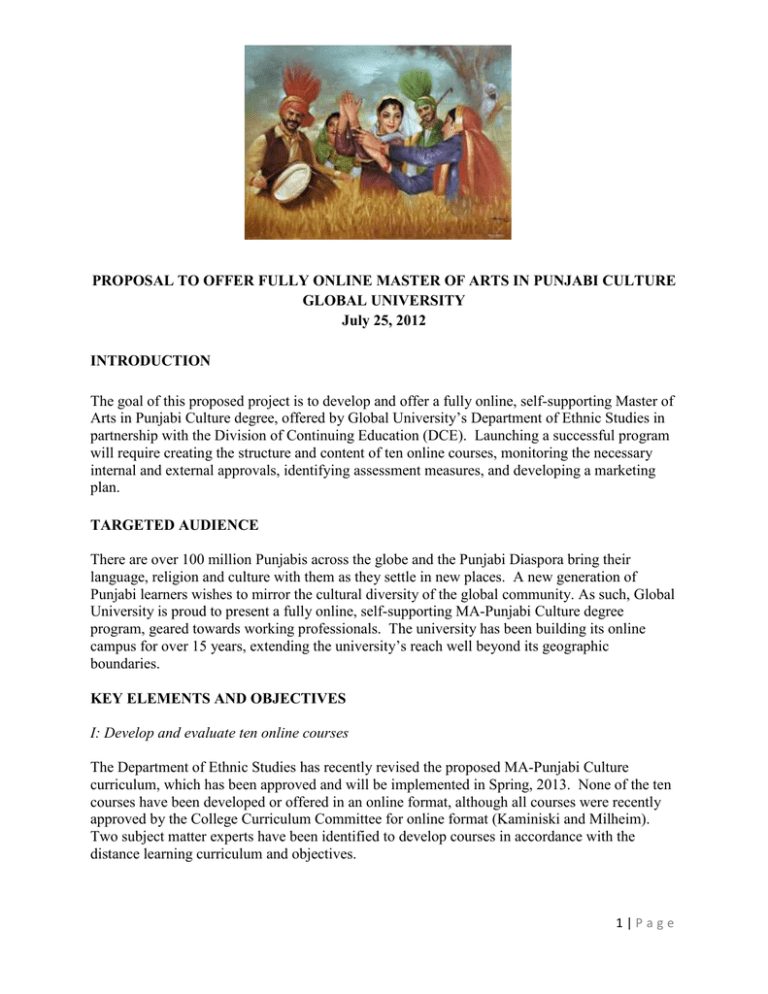
PROPOSAL TO OFFER FULLY ONLINE MASTER OF ARTS IN PUNJABI CULTURE GLOBAL UNIVERSITY July 25, 2012 INTRODUCTION The goal of this proposed project is to develop and offer a fully online, self-supporting Master of Arts in Punjabi Culture degree, offered by Global University’s Department of Ethnic Studies in partnership with the Division of Continuing Education (DCE). Launching a successful program will require creating the structure and content of ten online courses, monitoring the necessary internal and external approvals, identifying assessment measures, and developing a marketing plan. TARGETED AUDIENCE There are over 100 million Punjabis across the globe and the Punjabi Diaspora bring their language, religion and culture with them as they settle in new places. A new generation of Punjabi learners wishes to mirror the cultural diversity of the global community. As such, Global University is proud to present a fully online, self-supporting MA-Punjabi Culture degree program, geared towards working professionals. The university has been building its online campus for over 15 years, extending the university’s reach well beyond its geographic boundaries. KEY ELEMENTS AND OBJECTIVES I: Develop and evaluate ten online courses The Department of Ethnic Studies has recently revised the proposed MA-Punjabi Culture curriculum, which has been approved and will be implemented in Spring, 2013. None of the ten courses have been developed or offered in an online format, although all courses were recently approved by the College Curriculum Committee for online format (Kaminiski and Milheim). Two subject matter experts have been identified to develop courses in accordance with the distance learning curriculum and objectives. 1|Page Each course will include the following elements/areas: Course Description Area Includes course number, title, description, course learning objectives; instructor name, and contact information; required course textbooks, materials, computer capability and software. Instructor/Facilitator contact is provided to maximize their availability and to serve as a technical liaison to students (Hootstein). Syllabus Area The syllabus will contain the course outline by modules with beginning and ending dates, designated dates for exams, assignments, and policies regarding academic dishonesty, adherence to the Americans with Disabilities Act, grading criteria and policies, exam and other evaluation criteria. Module Area Each course will have 15 instructional modules, each with an overview, student learning objectives, assignments and due dates; instructional materials (mini-lecture, podcast, graphics, images, annotated PowerPoint presentation, video, case study, audio, etc.); hyperlinks to value-added websites; and quizzes and other exercises. Discussion Board The discussion board will contain the following forums: questions for the instructor, where students can post questions to the instructor and the instructor can respond; conference organized by instructor-designated topics, which will allow students to discuss module-related topics with other students and the instructor; and work areas reserved for use of assigned student groups working collaboratively online (Hootstein). Global University utilizes Blackboard Version 9.1 as its online learning management system. Blackboard provides several collaborative technology tools that enhance community building such as threaded discussions, wiki creation, document sharing, and e-portfolio. Learning how to use these tools effectively will contribute to the student’s learning. II: Procure all necessary approvals for online, self-supporting degree program In order to launch the self-supporting degree program, several approvals must first be obtained. The program must be approved by DCE and by the Global University Academic Senate. In addition, since the program is a fully online program, the program must be approved for online delivery by the Western Association of School and Colleges (WASC). III: Develop assessment evaluation measures The Chair of the Punjabi Department will be responsible for ensuring the uniform quality and consistency of the online courses and developing the assessment measures. For each course, students will be asked to evaluate their overall course satisfaction through the Global University student evaluations, which are administered on a regular basis. Course-specific student satisfaction questions will be added to the standard student evaluations. In addition, each course will have a pre- and post-test evaluating the stated student learning outcomes at the beginning and end of each course (Byers). Evaluation of the project will be based on student performance 2|Page in course assignments and examinations, student self-assessment of skills and knowledge, and student course evaluations. These will help measure learning outcomes, student competencies, and student satisfaction (Austin, Banta, Cross El-Khawas, Ewell, Hutchings, Marchese, McClenny, Mentkowski, Miller, Moran and Wright). OPPPORTUNITIES AND STRENGTHS Global University has been revered as a leader in online education with over 15 years of developing and offering online programs. The MA-Punjabi Culture degree in this innovative online format will fit well with students’ family and work schedules and will allow students to learn at their own pace, with no requirement to attend class on specific days or times. In addition, a fully online program will be less stressful for students as they will not be burdened with concerns about traffic, finding parking, or missing classes due to work or family emergencies. It will allow for full class participation, offering more opportunities for interaction with classmates and instructors and, in addition, the program will be “green,” in that driving and gas usage will be reduced. A fully online program can accommodate students with diverse learning styles and abilities, and all course content can be designed for accessibility. The fully online MA-Punjabi Culture is an innovative solution for increasing educational opportunity access without requiring students to leave their local communities. CHALLENGES, WEAKNESSES AND PROPOSED SOLUTIONS This program is a very specialized one that does not allow for much margin for error in terms of expected enrollments and budgetary flexibility. Solution: In order to address this, DCE’s marketing team will work closely with the department to ensure that the program is widely advertised to targeted populations to maximize enrollment. For a subject matter that is largely taught in person, it may be difficult for learners to feel like active participants. Solution: Special assignments are designed to mitigate this issue by requiring students to listen to selected Punjabi music and watch dances that are posted on YouTube. Since this is the first time these courses are taught in an online format, instructors may not be seasoned online instructors. Solution: Specialized training will be provided to instructors to familiarize them with online teaching and to incorporate technology into their instruction (Howell, Williams and Lindsay). SUMMARY The fully online and self-supporting MA-Punjabi Culture degree is one of several educational offerings that Global University can offer to working professionals with career responsibilities that prohibit regular attendance in physical location classes. DCE will seek out opportunities to present the process of developing this self-supporting program though presentations and regional and statewide meetings of faculty, as well as through meetings of Deans of Continuing Education within the Global University system. 3|Page WORKS CITED Austin, Banta, Cross El-Khawas, Ewell, Hutchings, Marchese, McClenny, Mentkowski, Miller, Moran and Wright, 9 Principles of Good Practice for Assessing Student Learning, https://bb.csueastbay.edu/bbcswebdav/courses/20123_EDUI_7801_01HA_SSD/20122_EDUI_6701_ 7801MRG_ImportedContent_20120307095319/9_Principle_of_Good_Practice_for_Assessing_Stud ent_Learning.pdf Byers, Angela, Interactive Assessment and Course Transformation Using Web-Based Tools, http://technologysource.org/article/interactive_assessment_and_course_transformation_using_w ebbased_tools/ Hootstein, Ed, Wearing Four Pairs of Shoes: The Roles of E-Learning Facilitators, http://www.astd.org/LC/2002/1002_hootstein.htm Howell, Williams and Lindsay, Thirty-two Trends Affecting Distance Education: An Informed Foundation for Strategic Planning, http://www.westga.edu/~distance/ojdla/fall63/howell63.html Kaminski, Karen and Milheim, William D., Institutional Challenges in the Creation and Delivery of an Online Degree Program, http://technologysource.org/article/institutional_challenges_in_the_creation_and_delivery_of_an_online_ degree_program/ 4|Page


